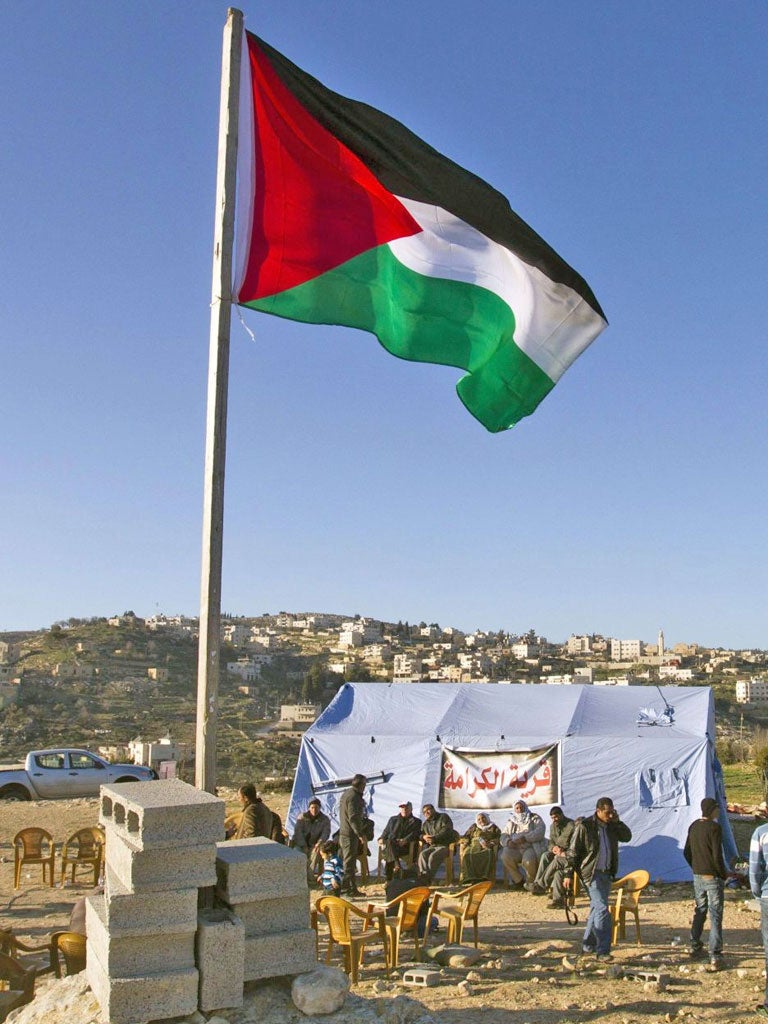The two-state solution: one nation decides
As right-wingers gain support, the Israeli election could end hopes for peace talks

Your support helps us to tell the story
From reproductive rights to climate change to Big Tech, The Independent is on the ground when the story is developing. Whether it's investigating the financials of Elon Musk's pro-Trump PAC or producing our latest documentary, 'The A Word', which shines a light on the American women fighting for reproductive rights, we know how important it is to parse out the facts from the messaging.
At such a critical moment in US history, we need reporters on the ground. Your donation allows us to keep sending journalists to speak to both sides of the story.
The Independent is trusted by Americans across the entire political spectrum. And unlike many other quality news outlets, we choose not to lock Americans out of our reporting and analysis with paywalls. We believe quality journalism should be available to everyone, paid for by those who can afford it.
Your support makes all the difference.Israelis go to the polls tomorrow for an election that could deliver one of the most right-wing governments in the Jewish state's history and deal a heavy blow to moribund peace talks with the Palestinians. Prime Minister Benjamin Netanyahu's alliance between his Likud party and former foreign minister Avigdor Lieberman's right-wing Yisrael Beiteinu party is tipped to win. But, for the first time, the coalition government that emerges in the days and weeks after the vote is also likely to include parties openly hostile to the peace process, including the Jewish Home party, led by the hawkish Naftali Bennett.
He has campaigned as the only party leader who does not believe in the two-state solution. His view is today's "imperfect" situation is better than allowing a viable Palestinian state.
Relations between Israelis and Palestinians are at one of their lowest ebbs, with the key issue of Jewish settlements in the West Bank – regarded as occupied territory by the international community – one of the major sticking points. Although the Likud-Beiteinu alliance is expected to take the most seats in parliament, the Knesset, final opinion polls on Friday showed a drop in the number it is likely to win. Support has been sapped partly by Jewish Home, but about 15 per cent of voters say they remain undecided.
In an attempt to shore up support, Mr Netanyahu took up the nationalist pro-settler rhetoric, telling the Maariv newspaper: "The days when bulldozers uprooted Jews are behind us, not in front of us. We haven't uprooted any settlements, we have expanded them. Nobody has any lessons to give me about love for the Land of Israel or commitment to Zionism and the settlements." He also promised that the next Israeli government would not dismantle any existing settlements.
In response to the Palestinians winning a vote on statehood at the UN General Assembly in November, the Israeli government has said it will start the process of settlement building in E1, an area of the West Bank. In the past week, Palestinian activists have responded by establishing two tented camps in areas earmarked for construction, in the hope of establishing so-called "facts on the ground" – a term used to take account of realities such as settlements when negotiating potential land swaps in any final deal.
At one camp – Bab Al-Karama, or "Gate Of Dignity" – in the West Bank village of Beit Iksa, Mahmoud al-Aloul, a member of the Fatah Central Committee, and someone who is close to Mahmoud Abbas, the Palestinian president, told The Independent: "Israel behaves as [Beit Iksa] is its land and we are the strangers here – we want to live in our own land. This is a new initiative that has been adopted as a strategy by the [Palestinian Authority] leadership. It is now part of the popular struggle to confront Israeli violations and settlements."
Saleem, a 20-year-old construction worker and volunteer at the camp, was building a small mosque from breeze blocks. He was adamant the protests would continue, saying: "Even if the Israelis come and destroy it, I'll come back and build it again."
His mettle may well be tested. According to reports, Israeli troops had arrived at the camp yesterday, told activists to knock the mosque down and were stopping supporters from crossing a nearby checkpoint.
It is not just on the ground the peace process appears stalled. There have been no direct talks between Israeli and Palestinian officials since 2010. The Palestinians refuse to negotiate while settlement-building continues, and Israelis insist that the PA must agree to a prerequisite that any future Palestinian state is demilitarised.
On an international level, too, there has been little progress. In his more than five years as Middle East peace envoy, Tony Blair has achieved little, and the main broker between the two sides, the United States, has become frustrated.
Despite the runes spelling a precarious period for the peace process, there are those that are hopeful for the future. "There is no distinction between the left and right blocs, there is a will for a two-state solution," says Sharon Savariego, a 26-year-old from Rishon Letzion, who works in Israel's booming tech industry.
Join our commenting forum
Join thought-provoking conversations, follow other Independent readers and see their replies
Comments